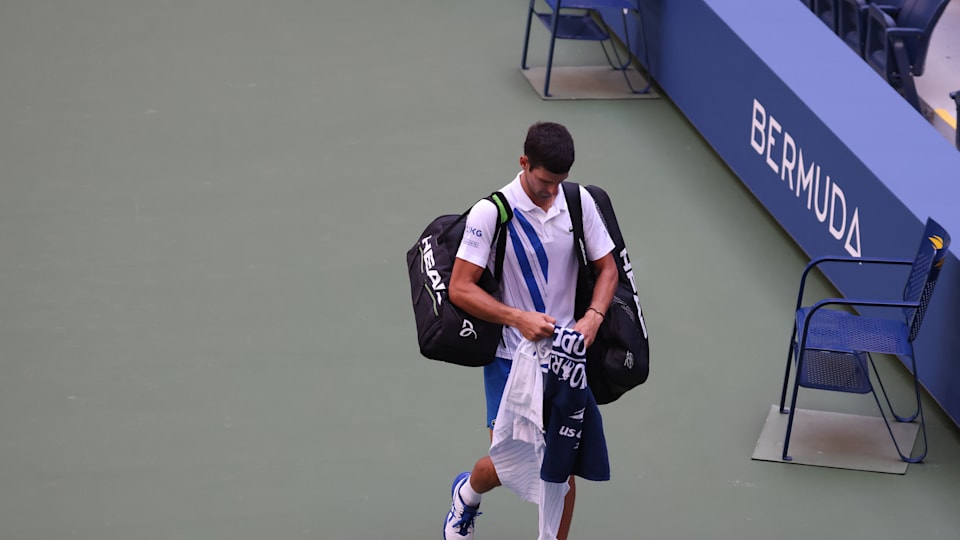Why was Novak Djokovic disqualified from US Open? A rare penalty explained
Novak Djokovic was disqualified after he accidentally hit a line judge with a ball that was not in play. Here’s what the rule book says.

World No.1 Novak Djokovic's disqualification from the US Open Grand Slam has been the biggest story of the tournament so far.
On Sunday, the Serb made an unusual exit while trailing in the first set against Spaniard Pablo Carrena Busta.
Neither a double fault nor a missed passing shot, Djokovic’s whip at a ball that was not in play floored a lineswoman and that was it!
Retired Indian tennis star Somdev Devvarman had his own opinion of the ‘freak incident’.
Here’s what happened at Flushing Meadows in New York.
The incident
Novak Djokovic was playing Carrena Busta in the men’s singles Round of 16 and was serving in the 11th game at 5-5 in the first set.
Djokovic was unable to hold serve though as Carrena Busta broke through for a 6-5 lead and would potentially have been serving for the set.
This was when the 17-time Grand Slam champion attempted to hit a stray ball into the empty stands in frustration. However, it inadvertently hit a line judge on the throat. Djokovic immediately rushed to check on her.
Following a long discussion between the Serbian superstar, the chair umpire and tournament referee Soeren Friemel, Carrena Busta was awarded the match on default.
What is default and why was Djokovic handed one?
All players have to adhere to a Code of Conduct and any violation, be it unsportsmanlike conduct, racquet abuse or ball abuse, are accompanied by penalties.
A warning is given for a first offence, a point penalty for a second and a game penalty is applied for every subsequent offence according to the ‘Point Penalty Schedule’ of the 2020 Grand Slam rule book.
However, in Djokovic’s case, Section T of Article III: On-site Player Offenses of the 2020 Grand Slam rule book, which lays out the procedure for default, was applied.
It states that ‘the Referee in consultation with the Grand Slam Chief of Supervisors may declare a default for either a single violation of this code or pursuant to the Point Penalty Schedule’.
Tournament referee Soeren Friemel decided to declare a default.
“The facts were discussed and explained by the chair umpire and the Grand Slam Supervisor,” Friemel said. “In this situation, it is especially important that we are 100 per cent sure what exactly happened. The facts were established, and then I had to speak to Novak Djokovic, give him the chance to state his point of view.
“His point was that he didn't hit the line umpire intentionally. We all agree that he didn't do it on purpose, but the facts are still that he hit the line umpire and that the line umpire was clearly hurt.”
The United States Tennis Association (USTA) then announced that Djokovic would lose all the ranking points he earned and also be fined the prize money (USD 250,000) he was entitled to for making the pre-quarters stage.
Novak Djokovic later put out an apology on his Instagram account.
Have such incidents occurred before?
Though it may be a rare penalty, there have been a few incidents in the past where players have been defaulted from a tournament.
Rising Canadian star Denis Shapovalov was handed a default in the deciding match of Canada’s 2017 Davis Cup World Group stage fixture against Great Britain.
Shapovalov was down two sets against Kyle Edmund when, similar to Djokovic, he hit a ball in anger which accidentally caught chair umpire Arnaud Gabas in the eye. Referee Brian Earley defaulted Shapovalov for unsportsmanlike conduct and also imposed a $7,000 fine.
Argentine David Nalbandian also received a default at the Queen’s Club, London in 2012 after he kicked at an advertising board in frustration after losing a point against Marin Cilic. The board struck a line umpire on the leg, who was left bleeding.
Former superstar John McEnroe’s opponent Mikael Pernfors was handed a default victory at the 1990 Australian Open after the American tennis star, who had already been warned for intimidating a lineswoman and fined a point for smashing his racquets, let out a few loud obscenities.
